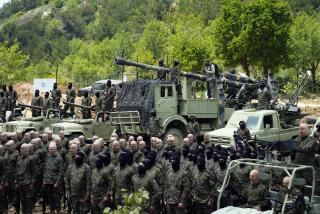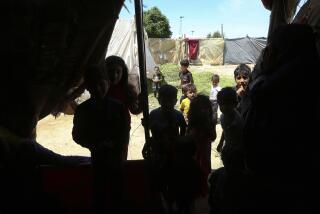Gemayel Reportedly Backs Return of Syria Troops in Bid to Quell Factional Strife
BEIRUT — Lebanese President Amin Gemayel was reported Friday to have raised the prospect of Syrian army troops returning to Beirut and other areas of Lebanon to help supervise a political settlement for the war-torn country.
Gemayel’s remarks, made to Lebanese reporters in Damascus late Thursday, followed two days of intensive talks between the Lebanese leader and Syrian President Hafez Assad.
Gemayel was quoted as saying that a solution for Lebanon’s 10 years of civil strife would have to be found in a “comprehensive political, security and reform plan” for the entire country. He added that Syrian troops “could form a strong force capable of implementing such a plan in cooperation with the Lebanese army.”
Weeks of Speculation
Gemayel’s comments represented the first official confirmation, after weeks of speculation, that he was contemplating seeking a return of Syrian troops to the Beirut area. The Syrians maintain a force of around 30,000 soldiers in parts of northern and eastern Lebanon.
In Beirut, meanwhile, Shia Muslim fighters of the Amal militia were reported to have overrun the Sabra refugee camp and captured its last Palestinian guerrilla defenders.
“Sabra has fallen after heroic battles by our men,” a Palestinian spokesman told the Associated Press on Friday. Other Palestinians said jubilant Shia militiamen were dynamiting Sabra’s tin-roofed houses and “leveling the camp bit by bit.”
Because Amal stopped reporters from entering the camp, the Palestinian claims could not be independently confirmed. The Amal attack on the Sabra camp broke a cease-fire called after 12 days of intense fighting.
Artillery Fire Reported
Beirut radio reported that artillery fire from Palestinian positions in the hills overlooking Beirut fell on Christian sectors of the Lebanese capital, killing at least four people.
In New York, meanwhile, the U.N. Security Council called for an end to violence against Lebanese civilians, particularly in and around the Palestinian refugee camps.
Gemayel’s somewhat ambiguous statement after his talks with Assad and before his return to Beirut set off speculation in the Beirut press about when Syrian troops might arrive in the Lebanese capital and what form their intervention might take.
The consensus appears to be that the Syrians and Lebanese both hope to avoid a situation similar to that in 1976, when a Syrian-dominated Arab Deterrent Force was sent to Lebanon to help end the civil war. Those Syrians, who were subject to constant attack in Beirut, withdrew from the capital after Israeli troops invaded Lebanon in June, 1982.
Lebanese political analysts believe that the Syrian leaders have told Gemayel that they would not want their troops to return to Beirut unless a Lebanese political consensus supports the move.
“The Syrians want to help police a political agreement, not impose one,” one analyst said.
High-Profile Deployment
It is widely believed that if agreement can be reached among Lebanon’s political groups, the Syrians will establish high-profile observation points at strategic locations, such as along major highways and on the so-called Green Line that divides Beirut into Christian and Muslim sectors.
The limited presence of Syrian troops would inhibit new fighting, this theory runs, because the threat of larger Syrian involvement would always be present.
Al Shark, a Beirut newspaper with close ties to the Damascus regime, remarked that Syrian troops would not “return to Lebanon to back one group against another. They will be here to sponsor the final, global solution to the Lebanese crisis on the basis of justice and sovereignty of the legal authority.”
It was evident that considerable attention in the Gemayel-Assad talks was paid to the shape of a political settlement but reports from Damascus gave no indication of what might have been decided.
Gemayel’s apparent approval of the idea of a return by Syrian troops to the Lebanese capital suggested a degree of support in his community of Maronite Christians, but it was not clear whether the plan would be accepted by such groups as the Lebanese Forces, the main Christian militia.
The Lebanese Forces staged a revolt against Gemayel in March over his policy of strengthening ties with Syria, but the militia was forced to make an abrupt turnabout and endorse closer ties with the Damascus regime.
The other main actors, Amal and the militia of the Druze sect’s Progressive Socialist Party, are close allies of Syria and are expected to go along with any settlement without protest.
More to Read
Sign up for Essential California
The most important California stories and recommendations in your inbox every morning.
You may occasionally receive promotional content from the Los Angeles Times.










